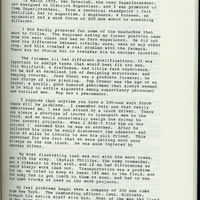097
Item
-
Title
-
097
-
Transcription
-
SUPERINTENDENT OF A CCC CAMP
In March 1935, Ben Osterloh, the camp Superintendent, was assigned as District Supervisor, and I was promoted to Camp Superintendent. From a technical standpoint I felt qualified, but to supervise, 2 engineers, 4 foremen, an agronomist and a work force of 200 men would be something different.
I was hardly prepared for some of the headaches that were to follow. The engineer taking my former position came from the east coast and had no farm experience. He did not know the difference between alfalfa, corn, oats or any other crop, and this created a real problem with the farmers. There was no choice but to transfer him to another location.
The foremen all had different qualifications. It was important to assign tasks that would best fit the man. Bill Whitfield, a draftsman, had little farm experience, but he did an excellent job of designing structures, and keeping records. Jess Money was a graduate forester, he took charge of tree planting. Pop Cramer was the age of my father, a portly, good humored gentlemen that always seemed to be able to settle arguments among supervisory personnel and enrolled men. Pop was a peacemaker.
I suppose that anytime you have a 200-man work force there will be problems. I remember only one that really embarrassed me, I was out witted by a truck driver. There was always a shortage of trucks to transport men to the field, and we would occasionally assign one driver to cover several projects. When I didn't find him on one project I assumed that he was on another. After he delivered his crew he would disconnect the odometer and drive 60 miles to Lincoln to see his girl friend. This accounted for the fact that we were getting such poor mileage on the one truck. He was soon replaced by another driver.
My most frustrating task was not with the work crews, but with the army. Captain Phillips, the camp commander, was a pleasure to work with, and if we had differences we could always work them out. Transportation was a problem for us, we tried to keep at least 185 men in the field, and the army had to get lunch to them at noon, and had to use the same trucks we used on the work projects.
My real problems began when a company of 200 men came from New York. The commanding officer, Leut. Gidinsky, brought his entire staff with him. Most of the men had lived in New York City, and the philosophy of the people in a small town in Nebraska was not the same as New York.
-
Rights
-
To inquire about usage, please contact Archives & Special Collections, University of Nebraska-Lincoln Libraries. These images are for educational use only. Not all images are available for publication.
 Metzger Memories
Metzger Memories
 Metzger Memories
Metzger Memories
